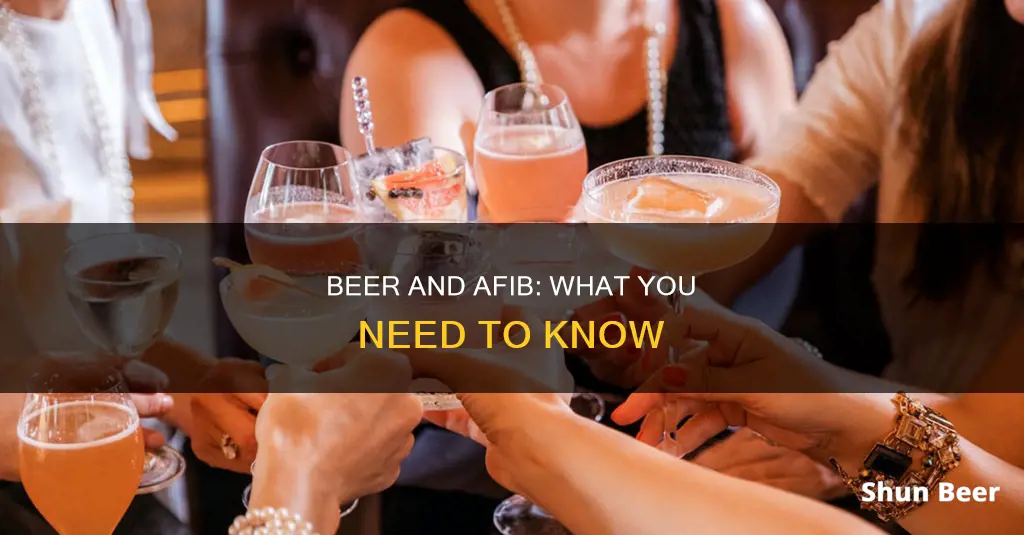
Drinking alcohol is known to increase the risk of atrial fibrillation (AFib), a condition that causes the heart to beat rapidly and irregularly, leading to potential blood clots, strokes, and heart failure. While past studies have suggested moderate drinking may have heart health benefits, recent evidence indicates that even small amounts of alcohol can be harmful. For those already diagnosed with AFib, alcohol can trigger symptoms such as heart palpitations, with one drink doubling the odds of an AFib episode within four hours. Binge drinking, defined as consuming more than five drinks in a row, is particularly dangerous and can lead to holiday heart syndrome, a phenomenon where overindulgence in alcohol during holidays results in heart issues. Therefore, it is generally recommended to avoid alcohol or limit consumption to an occasional drink on special occasions, especially for those at risk of or diagnosed with AFib.
What You'll Learn

Binge drinking and AFib
Binge drinking, or consuming more than five drinks in a row, can have detrimental effects on your heart health, especially if you have AFib.
Binge drinking can trigger AFib symptoms such as heart palpitations. Doctors refer to this phenomenon as "holiday heart" because they tend to see more cases of it around holidays when people are more likely to overindulge in alcohol. Even if you don't have AFib, binge drinking can increase your risk of developing it.
Research has shown that binge drinking triggers the nervous system to overstimulate the heart, leading to AFib. This is because alcohol disrupts the heart's natural pacemaker—the electrical signals that are supposed to keep it beating at the right pace. As a result, your heart beats really fast and out of rhythm, increasing your risk of blood clots, strokes, heart failure, and other heart conditions.
For people who already have AFib, alcohol can have an almost immediate effect on their heart rhythm. A study found that a single drink doubled the odds of an AFib episode within the next four hours. Another study found that AFib patients who abstained from alcohol for six months had fewer AFib episodes.
In addition to the risks associated with AFib, binge drinking also increases the risk of other health issues, including car accidents, violence, high blood pressure, and various cancers.
So, if you already have AFib or are at risk for it, it's important to avoid binge drinking. If you're unsure about how much alcohol is safe for you, talk to your doctor about your individual risk factors and health history. Remember, when it comes to AFib and alcohol, your own response to alcohol will determine your safety guidelines.
Beer After Work: Relax, Unwind, and Socialize
You may want to see also

Moderate drinking and AFib
For people with AFib, even a moderate amount of alcohol can increase their risk of developing serious health issues, including heart failure and stroke. According to the Dietary Guidelines for Americans, moderate drinking is defined as no more than one drink per day for women and no more than two drinks per day for men. However, research has shown that moderate drinking can increase the risk of AFib by about 14% in people over 55 who have heart disease or diabetes. An observational study also found that a single drink per day was linked to a 16% higher risk of developing AFib compared to not drinking at all.
The link between moderate drinking and AFib is further supported by a study that created 3D structural maps of the left atrium in people with AFib. This study found that moderate drinkers had more evidence of scarring and electrical signalling problems in their atria compared to light drinkers and non-drinkers. The severity of these problems was directly linked to the severity of AFib among the participants.
Additionally, for people who already have AFib, alcohol can have an almost immediate effect on their heart rhythm. A study found that a single drink doubled the odds of an AFib episode within the next four hours, and this risk increased with every additional drink. Therefore, it is recommended that people with AFib avoid alcohol or limit themselves to an occasional drink on special occasions.
It is important to note that the risk of developing AFib is not only dependent on alcohol consumption but also on other factors such as age, gender, and the presence of other health conditions. Maintaining a healthy weight, staying physically active, and finding healthy ways to manage stress can also help lower the risk of AFib.
Beer and Watermelon: A Safe, Sweet Combo?
You may want to see also

Holiday heart syndrome
Causes
Binge drinking can trigger AFib by disrupting the heart's natural pacemaker, the electrical signals that are supposed to keep it beating at the right pace. Alcohol can also cause electrolyte disturbances and changes in the autonomic nervous system, which controls involuntary functions such as lung and heart function. In addition, alcohol has a direct toxic effect on heart tissue and can cause stress and injury to the cells.
Symptoms
The most common symptom of holiday heart syndrome is the sudden onset of palpitations, where someone feels like their heart is beating fast or irregularly. These palpitations can be intermittent or continuous. Other symptoms include shortness of breath, dizziness, chest pain, fatigue, generalized weakness, angina, and near syncope, especially if the heart rate is significantly elevated.
Treatment and Prevention
If you are experiencing these symptoms, and they are severe or last for more than a few minutes, it is recommended to seek medical attention. Treatment for holiday heart syndrome may include medications to help slow the heart rate or a cardioversion procedure to restore a normal rhythm. In most cases, AFib episodes will resolve within 12-24 hours, but in some cases, they may persist, and other treatment may be required.
The best way to avoid holiday heart syndrome is to avoid binge drinking. It is generally recommended not to exceed more than one drink per day for women or two drinks per day for men. Eating and drinking in moderation, staying active, and managing stress can also help prevent holiday heart syndrome.
Beer Tube Screens: How Do They Work?
You may want to see also

Alcohol's effect on the heart
Alcohol and AFib Risk
Cardiologists have long suspected a link between alcohol consumption and an increased risk of AFib, and recent studies have confirmed this connection. Research suggests that drinking alcohol, even in moderate amounts, can elevate the chances of developing AFib. This risk increases with the quantity of alcohol consumed, with heavy drinking and binge drinking being particularly detrimental.
Immediate Effects of Alcohol on Heart Rhythm
Several studies have found that alcohol can have an immediate or near-immediate effect on heart rhythm, significantly increasing the likelihood of an AFib episode. One study showed that a single drink doubled the odds of AFib occurring within the next four hours, while two or more drinks tripled the risk. Additionally, every 0.1% increase in blood alcohol level was associated with a 40% higher chance of an AFib episode.
Alcohol's Impact on the Heart
Alcohol is believed to disrupt the heart's natural pacemaker—the electrical signals that regulate its pace. This disruption can lead to heart palpitations and an irregular heartbeat, which are characteristic of AFib. Research utilising 3D structural maps of the left atrium (one of the heart's upper chambers) found that moderate drinkers had more evidence of scarring and electrical signalling problems compared to light drinkers and nondrinkers. The severity of these issues correlated directly with the severity of AFib among participants.
Recommendations and Guidelines
While there are no definitive atrial fibrillation guidelines on alcohol consumption, health experts generally advise against heavy drinking and binge drinking for those with AFib or at risk of developing it. Moderate drinking, defined as no more than one drink per day for women and no more than two drinks per day for men, may be acceptable for some individuals without other risk factors. However, even moderate drinking can increase AFib risk, especially for those over 55 with heart disease or diabetes.
Given the potential risks, individuals are encouraged to consult with their doctors to determine their personal safety guidelines regarding alcohol consumption. It is worth noting that maintaining a healthy weight and engaging in regular exercise can also help lower the risk of AFib and improve overall heart health.
Celiac Disease and Beer: What's Safe to Drink?
You may want to see also

AFib triggers
Atrial fibrillation (AFib) is a condition that causes your heart to beat rapidly and out of rhythm. It can lead to blood clots, strokes, heart failure, and other heart conditions. While there are no definitive guidelines on how much alcohol is safe to drink for those with AFib, health experts agree that heavy drinking and AFib don't mix. Alcohol can trigger AFib symptoms such as heart palpitations.
Research shows that drinking alcohol may increase the risk of developing AFib. A study published in the Journal of the American College of Cardiology concluded that avoiding alcohol completely is the best way to avoid the risk of AFib. Another study in the Canadian Medical Association Journal found that moderate drinking (no more than one drink per day for women and no more than two drinks per day for men) increased the risk of AFib by about 14% in people over 55 with heart disease or diabetes.
Binge drinking, defined as consuming more than five drinks in a row, is especially harmful and can trigger AFib. A study presented at the American College of Cardiology's Annual Scientific Session found that just one drink doubled the odds of an AFib episode within the next four hours, and this risk tripled with two or more drinks. Additionally, for every 0.1% increase in blood alcohol level, the risk of AFib increased by 40%.
Even small amounts of alcohol may harm the heart. A study of 108,000 people found that compared to non-drinkers, consuming just one alcoholic drink per day increased the risk of AFib by 16% over a 14-year period. The risk increased with more alcohol intake, with two drinks per day associated with a 28% higher risk, and this rose to 47% for those consuming more than four drinks.
Therefore, while there is no one-size-fits-all answer, it is generally recommended to limit alcohol consumption to occasional drinks and be mindful that the risk of AFib increases significantly with each additional drink.
Light Beer and Weight Loss: Friend or Foe?
You may want to see also
Frequently asked questions
It is not recommended to drink beer or any other alcoholic beverage if you have AFib. Alcohol can trigger symptoms of the condition, such as heart palpitations.
Even a single drink of beer per day can double the risk of AFib. The risk increases with the number of drinks, with more than two drinks in one sitting leading to a threefold higher chance of experiencing AFib.
AFib stands for atrial fibrillation, a condition where the heart beats in an abnormal rhythm. It can lead to blood clots, strokes, heart failure, and other heart conditions.
AFib can cause shortness of breath, near fainting spells, or a sensation that the heart is beating out of control.







